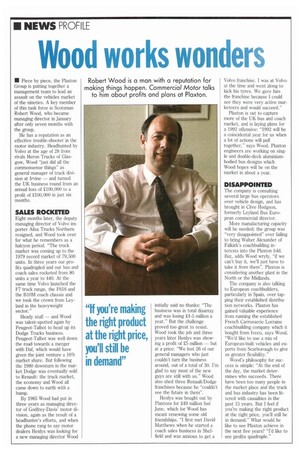Wood works wonders
Page 26

If you've noticed an error in this article please click here to report it so we can fix it.
Robert Wood is a man with a reputation for making things happen. Commercial Motor talks to him about profits and plans at Plaxton.
• Piece by piece, the Plaxton Group is putting together a management team to lead an assault on the vehicles market of the nineties. A key member of this task force is Scotsman Robert Wood, who became managing director in January after only seven months with the group.
He has a reputation as an effective trouble-shooter in the motor industry. Headhunted by Volvo at the age of 28 from rivals Heron Trucks of Glasgow, Wood "just did all the commonsense things" as general manager of truck division at Irvine — and turned the UK business round from an annual loss of £100,000 to a profit of £100,000 in just six months.
SALES ROCKEIED
Eight months later, the deputy managing director of Volvo importer Ailsa Trucks Northern resigned, and Wood took over for what he remembers as a halcyon period. "The truck market was coming up to the 1979 record market of 79,500 units. In three years our profits quadrupled and our bus and coach sales rocketed from 80 units a year to 440, At the same time Volvo launched the F7 truck range, the F616 and the MOM coach chassis and we took the crown from Leyland in the heavyweight sector."
Heady stuff — and Wood was talent-spotted again by Peugeot-Talbot to head up its Dodge Trucks business. Peugeot-Talbot was well down the road towards a merger with Oaf, which would have given the joint venture a 16% market share. But following the 1980 downturn in the market Dodge was eventually sold to Renault: the truck market, the economy and Wood all came down to earth with a bump.
By 1985 Wood had put in three years as managing director of Godfrey-Davis' motor division, again as the result of a headhunter's efforts, and when the phone rang to say motor dealers Henlys was looking for a new managing director Wood initially said no thanks: ''The business was in total disarray and was losing £4-5 million a year." But the challenge proved too great to resist. Wood took the job and three years Later Henlys was showing a profit of 25 million — but at a price: "We lost 26 of our general managers who just couldn't turn the business around, out of a total of 30. I'm glad to say most of the new guys are still with us." Wood also shed three Renault/Dodge franchises because he "couldn't see the future in them".
Henlys was bought out by Plaxtons for 249 million last June, which for Wood has meant renewing some old friendships. "I first met David Matthews when he started a coach sales business in Sheffield and was anxious to get a Volvo franchise. I was at Volvo at the time and went along to kick his tyres. We gave him the franchise because I could see they were very active marketeers and would succeed."
Plaxton is out to capture more of the UK bus and coach market, and is laying plans for a 1992 offensive: "1992 will be a coincidental year for us when a lot of actions will pull together," says Wood. Plaxton engineers are working on single and double-deck aluminiumbodied bus designs which Wood hopes will be on the market in about a year.
DISAPPOINTED
The company is consulting several large bus operators over vehicle design, and has brought in Clive Hodgson, formerly Leyland Bus European commercial director.
More manufacturing capacity will be needed; the group was very disappointed" over failing to bring Walter Alexander of Falkirk's coachbuilding interests into the Plaxton fold. But, adds Wood wryly, "if we can't buy it, we'll just have to take it from them". Plaxton is considering another plant in the North or the Midlands.
The company is also talking to European coachbuilders, particularly in Spain, over tapping their established distribution networks. Plaxton has gained valuable experience from running the established French Carrosserie Lorraine coachbuilding company which it bought from lveco, says Wood. "We'd like to use a mix of European-built vehicles and exports from Scarborough to give us greater flexibility."
Wood's philosophy for success is simple: "At the end of the day, the market determines who succeeds. There have been too many people in the market place and the truck and bus industry has been littered with casualties in the past 15 years. But [feel if you're making the right product at the right price, you'll still be in demand." What would he like to see Plaxton achieve in the next five years? "I'd like to see profits quadruple."
















































































































































